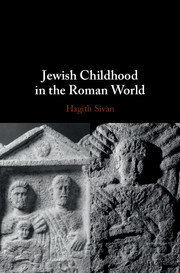Refine search
Actions for selected content:
23990 results in Ancient history
Figures, Tables and Maps
-
- Book:
- The Early Hellenistic Peloponnese
- Published online:
- 30 May 2018
- Print publication:
- 14 June 2018, pp x-x
-
- Chapter
- Export citation
Preface and Acknowledgements
-
- Book:
- The Early Hellenistic Peloponnese
- Published online:
- 30 May 2018
- Print publication:
- 14 June 2018, pp xxi-xxiv
-
- Chapter
- Export citation

Jewish Childhood in the Roman World
-
- Published online:
- 08 June 2018
- Print publication:
- 17 May 2018
3 - Approaching the Hellenistic Polis through Modern Political Theory: The Public Sphere, Pluralism and Prosperity
-
-
- Book:
- Ancient Greek History and Contemporary Social Science
- Published by:
- Edinburgh University Press
- Published online:
- 06 May 2021
- Print publication:
- 06 June 2018, pp 68-98
-
- Chapter
- Export citation
9 - Understanding the Politics of Pericles around 450 BCE: The Benefits of an Economic Perspective
-
-
- Book:
- Ancient Greek History and Contemporary Social Science
- Published by:
- Edinburgh University Press
- Published online:
- 06 May 2021
- Print publication:
- 06 June 2018, pp 269-292
-
- Chapter
- Export citation
10 - Cash and Crowns: A Network Approach to Greek Athletic Prizes
-
-
- Book:
- Ancient Greek History and Contemporary Social Science
- Published by:
- Edinburgh University Press
- Published online:
- 06 May 2021
- Print publication:
- 06 June 2018, pp 293-312
-
- Chapter
- Export citation
12 - Economic (In)Equality and Democracy: The Political Economy of Poverty in Athens
-
-
- Book:
- Ancient Greek History and Contemporary Social Science
- Published by:
- Edinburgh University Press
- Published online:
- 06 May 2021
- Print publication:
- 06 June 2018, pp 344-375
-
- Chapter
- Export citation
Index
-
- Book:
- Ancient Greek History and Contemporary Social Science
- Published by:
- Edinburgh University Press
- Published online:
- 06 May 2021
- Print publication:
- 06 June 2018, pp 581-591
-
- Chapter
- Export citation
1 - Behavioural Economics and Economic Behaviour in Classical Athens
-
-
- Book:
- Ancient Greek History and Contemporary Social Science
- Published by:
- Edinburgh University Press
- Published online:
- 06 May 2021
- Print publication:
- 06 June 2018, pp 15-46
-
- Chapter
- Export citation
19 - Technology and Society in Classical Athens: A Study of the Social Context of Mining and Metallurgy at Laurion
-
-
- Book:
- Ancient Greek History and Contemporary Social Science
- Published by:
- Edinburgh University Press
- Published online:
- 06 May 2021
- Print publication:
- 06 June 2018, pp 529-557
-
- Chapter
- Export citation
PART VI - TECHNOLOGY AND INNOVATION
-
- Book:
- Ancient Greek History and Contemporary Social Science
- Published by:
- Edinburgh University Press
- Published online:
- 06 May 2021
- Print publication:
- 06 June 2018, pp 483-484
-
- Chapter
- Export citation
14 - Exploring Intercommunity Political Activity in Fourth- Century Greece
-
-
- Book:
- Ancient Greek History and Contemporary Social Science
- Published by:
- Edinburgh University Press
- Published online:
- 06 May 2021
- Print publication:
- 06 June 2018, pp 405-432
-
- Chapter
- Export citation
5 - Rethinking Mass and Elite: Decision-Making in the Athenian Law-Courts
-
-
- Book:
- Ancient Greek History and Contemporary Social Science
- Published by:
- Edinburgh University Press
- Published online:
- 06 May 2021
- Print publication:
- 06 June 2018, pp 157-183
-
- Chapter
- Export citation
13 - The Distribution of Wealthy Athenians in the Attic Demes
-
-
- Book:
- Ancient Greek History and Contemporary Social Science
- Published by:
- Edinburgh University Press
- Published online:
- 06 May 2021
- Print publication:
- 06 June 2018, pp 376-402
-
- Chapter
- Export citation
Contents
-
- Book:
- Ancient Greek History and Contemporary Social Science
- Published by:
- Edinburgh University Press
- Published online:
- 06 May 2021
- Print publication:
- 06 June 2018, pp v-vii
-
- Chapter
- Export citation
PART IV - WEALTH, POVERTY AND INEQUALITY
-
- Book:
- Ancient Greek History and Contemporary Social Science
- Published by:
- Edinburgh University Press
- Published online:
- 06 May 2021
- Print publication:
- 06 June 2018, pp 313-314
-
- Chapter
- Export citation
16 - The Koinon Dogma, the Mercenary Threat and the Consolidation of the Democratic Revolutions in Mid- Fifth-Century Sicily
-
-
- Book:
- Ancient Greek History and Contemporary Social Science
- Published by:
- Edinburgh University Press
- Published online:
- 06 May 2021
- Print publication:
- 06 June 2018, pp 455-482
-
- Chapter
- Export citation
8 - Patronage in Ancient Sparta
-
-
- Book:
- Ancient Greek History and Contemporary Social Science
- Published by:
- Edinburgh University Press
- Published online:
- 06 May 2021
- Print publication:
- 06 June 2018, pp 241-268
-
- Chapter
- Export citation
PART II - INSTITUTIONS
-
- Book:
- Ancient Greek History and Contemporary Social Science
- Published by:
- Edinburgh University Press
- Published online:
- 06 May 2021
- Print publication:
- 06 June 2018, pp 99-100
-
- Chapter
- Export citation
15 - Hegemonic Legitimacy (and its Absence) in Classical Greece
-
-
- Book:
- Ancient Greek History and Contemporary Social Science
- Published by:
- Edinburgh University Press
- Published online:
- 06 May 2021
- Print publication:
- 06 June 2018, pp 433-454
-
- Chapter
- Export citation
